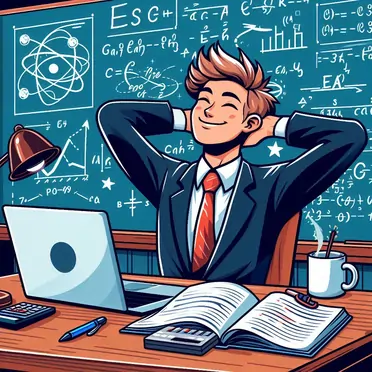How to Ace Physics Exams with Proven Strategies for Success

Physics exams demand quick thinking, a strong grasp of core principles, and the ability to solve complex problems under tight deadlines. While the pressure can be daunting, the right approach transforms stress into confidence. Whether you're tackling advanced topics alone or tapping into expert resources like Online Physics Exam Help or an Online Exam Helper, success is rooted in blending solid preparation with effective strategies. Start by mastering key concepts through structured study sessions, revisiting quantum mechanics, electromagnetism, or thermodynamics as needed. Practice problem-solving consistently with timed simulations to build speed and accuracy. Leverage collaborative learning, past exam reviews, and reliable online resources to fill gaps in understanding. When exam day arrives, stay composed with time management tactics and focus on incremental progress tackling easy questions first to build momentum. Ultimately, excelling in physics is about preparation, strategy, and mindset. With the right tools and approach, you can conquer any physics challenge, no matter how complex it seems.

Strategic Preparation for Physics Exams
Preparation isn't just about hard work—it's about working smart. Here’s how to equip yourself for tackling any physics exam with ease.
Grasping Core Concepts
A solid understanding of basic principles is the key to solving advanced problems. Here’s how to approach critical areas:
Quantum Numbers and Energy Levels
Quantum numbers govern the behavior of systems in quantum mechanics. They include:
- Principal (n): Indicates the size and energy level.
- Orbital (l): Defines the shape of the orbital.
- Magnetic (m): Specifies orientation in space.
- Spin (s): Distinguishes particle spin states.
How to prepare:
- Memorize these quantum numbers and their relationships to energy states.
- Study specific cases like positronium and hydrogen atoms to see the concepts in action.
- Practice identifying degeneracies and state behaviors in low and high magnetic fields.
Magnetic Moments and the Zeeman Effect
Many problems revolve around magnetic properties and their effects under external fields:
- Learn the equations for magnetic moments in different energy states.
- Sketch energy level diagrams showing shifts due to the Zeeman effect.
- Understand how quantum numbers affect hyperfine structures.
Radiation and Thermodynamics
Understanding interactions between light and matter is essential. For instance:
- Study the relationships between population distributions and Einstein coefficients.
- Derive spectral energy density equations for systems in 1D, 2D, and 3D configurations.
- Practice recognizing how temperature influences atomic systems.
Becoming a Problem-Solving Pro
Beyond understanding theory, physics exams test your ability to solve complex, multi-step problems efficiently.
Breaking Down Problems
Tackling physics problems can feel overwhelming, but breaking them into manageable parts makes them solvable:
- Identify the core concept: Recognize whether the question involves forces, energy, fields, or quantum properties.
- Write what you know: Start with the given values and equations.
- Use logical steps: Avoid jumping ahead and clearly document each stage.
Practice with Purpose
Expose yourself to questions similar to what you expect:
- Solve problems on hyperfine splitting, field interactions, or energy transitions.
- Tackle past exams with time limits to simulate the actual test.
- Learn common pitfalls by reviewing detailed solutions.
Perfecting Dimensional Analysis
Dimensional analysis can:
- Help you verify that equations make sense.
- Save time when deriving or rearranging formulas.
- Reduce errors in high-pressure scenarios.
Building Productive Study Habits
Success in physics stems from a mix of preparation techniques and consistent effort. Here’s how to build a winning routine:
Using Practice Exams Effectively
Analyzing past exams helps you:
- Spot recurring topics, such as the AC Stark effect or energy states.
- Familiarize yourself with the format, reducing surprises on test day.
- Time yourself for sections to ensure you’re pacing well.
Learning Collaboratively
Group studies can be powerful:
- Share unique approaches and clarify doubts with peers.
- Simulate a classroom environment by teaching others.
- Stay motivated through mutual accountability.
Memorization Tricks
In physics, certain concepts and equations must be at your fingertips. Try these techniques:
- Use acronyms for memorizing sequences like quantum numbers.
- Create summary sheets of key equations, constants, and derivations.
- Incorporate flashcards or spaced-repetition software to reinforce learning.
Strategies for Test Day Success
Even with thorough preparation, handling the actual exam requires mental clarity and smart tactics. Here’s how to stay on top:
Time Management Tips
Physics exams are often a mix of conceptual and calculation-heavy problems. Plan your time wisely:
Start with a Bird’s-Eye View
- Skim through the paper to identify familiar and challenging questions.
- Prioritize high-value problems you can solve quickly to maximize your score.
Use a Smart Approach
- First Pass: Solve all straightforward problems to build confidence.
- Second Pass: Focus on moderately tricky questions you skipped earlier.
- Final Review: Double-check your work and attempt remaining questions if time permits.
Adapting to Different Question Types
Every physics exam includes a variety of question formats. Knowing how to approach each can save time and frustration:
Tackling Derivations
Derivation questions test your understanding of principles. Nail them by:
- Breaking the process into small, logical steps.
- Clearly labeling assumptions and intermediate results.
- Summarizing the derivation with the final equation.
Handling Graphs and Diagrams
Graphs are vital tools for visualizing relationships:
- Practice interpreting diagrams like energy versus magnetic field plots.
- Label axes carefully and ensure consistency in sketches.
- Recognize patterns in data to verify your calculations.
Mastering Calculations
Calculation-intensive questions can be daunting. Approach them methodically:
- Write every step to avoid confusion.
- Double-check units and ensure dimensional consistency.
- Round answers only in the final step to maintain precision.
Staying Calm and Focused
Exams can be stressful, but maintaining composure is crucial:
- Take deep breaths if anxiety creeps in.
- Break tough problems into smaller components to make them more approachable.
- Use confidence boosters, like solving a simpler question, to regain momentum.
Expert Tips for Long-Term Success
Thriving in physics exams requires more than last-minute cramming. Build a foundation of habits and strategies:
Focus on Key Areas
Physics spans diverse topics. Maximize your efforts by:
- Deep-diving into areas that frequently appear in exams.
- Reviewing challenging concepts like quantum transitions and multi-level systems.
- Regularly testing yourself on basic and advanced problems.
Balance Theory and Practice
Understanding theory is important, but consistent practice solidifies knowledge. Strike a balance:
- Dedicate 50% of your study time to solving problems.
- Use the other 50% for concept reviews and studying derivations.
- Alternate between timed practice and untimed explorations to cover both precision and speed.
Stay Curious
Keep physics exciting and relevant by connecting concepts to real-world phenomena. For instance:
- Relate quantum mechanics to modern technologies like lasers and MRIs.
- Explore how thermodynamics applies to climate models or engine designs.
- Look for interdisciplinary links, like how physics shapes medical imaging techniques.
Conclusion
Excelling in physics exams isn’t just about memorization—it’s about mastering concepts, applying strategies, and staying composed under pressure. By combining strong preparation, smart exam-day tactics, and a deep curiosity for the subject, you can overcome challenges and achieve success. The next time you open a physics exam, you’ll feel confident, prepared, and ready to perform at your best.